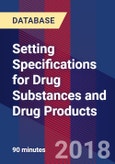Why Should You Attend:
A specification is defined as a list of tests, references to analytical procedures and appropriate acceptance criteria that are numerical limits, ranges or other criteria for the tests described. It establishes the set of criteria to which a drug substance or drug product should conform to be considered acceptable for its intended use. ``Conformance to specifications'' means that the drug substance and drug product, when tested according to the listed analytical procedures and meeting the listed acceptance criteria.Specifications are critical quality standards that are proposed and justified by the manufacturer and approved by regulatory authorities as conditions of approval.
Specifications are one part of a total control strategy for the drug substance and drug product designed to ensure product quality and consistency. Other parts of this strategy include thorough product characterization during development, upon which specifications are based and adherence to good manufacturing practices (GMP's), e.g., suitable facilities, a validated manufacturing process, validated test procedures, raw materials testing, in-process testing and stability testing.
Specifications are chosen to confirm the quality of the drug substance and drug product rather than to establish full characterization and should focus on those characteristics found to be useful in ensuring the safety and efficacy of the drug substance and drug product.
This webinar will teach you to set specifications for drug substance and drug product, including use of release test data, long term stability; accelerated stability & special stability studies. The webinar will also cover changing specifications during lifecycle management.
Areas Covered in the Webinar:
- Setting initial specifications
- How to use available data and justify specifications
- ICH specific requirements will be discussed
- Information required to be submitted during the lifecycle
- Updating the specifications during development & commercial phases
Who Will Benefit:
- Manufacturing
- Supply chain
- Technical operations
- Quality control
- Quality assurance
- Regulatory affairs
Speaker
Peggy BerryCourse Provider

Peggy Berry,









